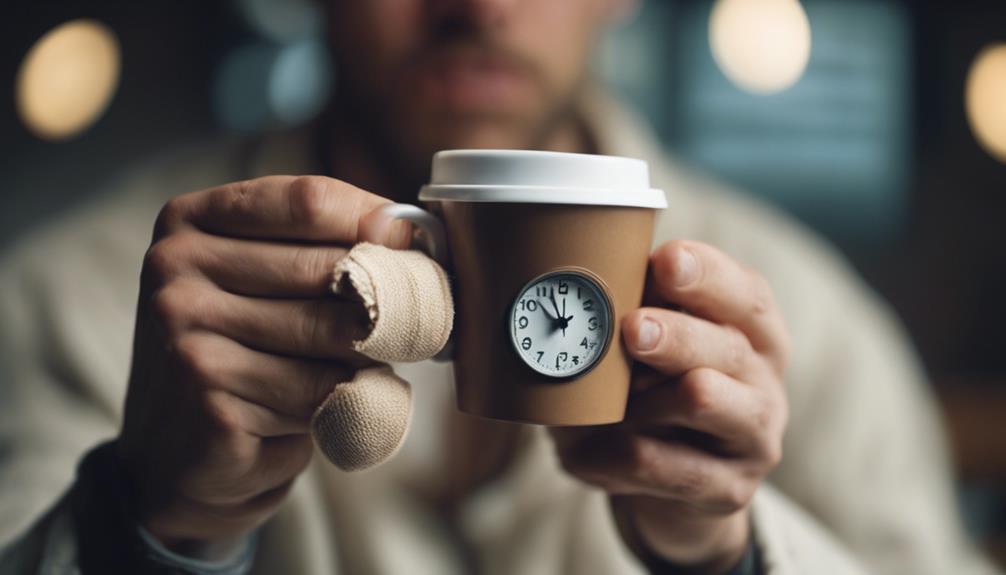Consuming coffee immediately after having a tooth extracted can result in a dry socket and impede the healing process. The acidity and heat of coffee can cause irritation to the nerves and increase the risk of bleeding, while caffeine can interfere with blood clotting, ultimately slowing down the recovery. It is recommended to wait at least 72 hours before drinking lukewarm or cold coffee to prevent any complications. Starting with warm beverages can help promote proper healing and reduce risks. It is important to prioritize your recovery by refraining from coffee too soon after an extraction, which will contribute to a smoother healing process. It is crucial to understand the impact of coffee on your recovery during this 72-hour window for optimal healing outcomes.
Key Takeaways
- Waiting 72 hours post-extraction is crucial to prevent complications.
- Lukewarm/cold coffee after 72 hours reduces risks of dry socket.
- Early coffee consumption hinders healing and clot formation.
- Consult professionals for personalized guidance on post-extraction coffee.
- Hot coffee can disrupt blood clotting and delay recovery.
Risks of Drinking Coffee Post-Extraction
Drinking coffee after a tooth extraction poses significant risks that can impede your healing process and lead to complications. Specifically, consuming coffee after wisdom teeth removal can increase the likelihood of developing a dry socket. This condition arises when the blood clot that forms in the extraction site becomes dislodged, exposing the underlying nerves and bone to air, food particles, and liquids, causing severe pain and delayed healing.
Moreover, the acidity and heat of coffee can irritate the sensitive nerve endings in the extraction site, further hindering the recovery process. Additionally, the caffeine present in coffee can elevate your blood pressure, potentially leading to increased bleeding and interfering with the formation of a stable blood clot necessary for proper healing.
To prevent these complications, it's important to wait at least 72 hours before consuming lukewarm or cold coffee post-extraction. Immediate coffee intake can disrupt the blood clot formation, prolonging healing time and increasing the risk of complications.
It's essential to prioritize your oral health by avoiding coffee consumption in the initial days following a tooth extraction.
Impact of Caffeine on Healing Process
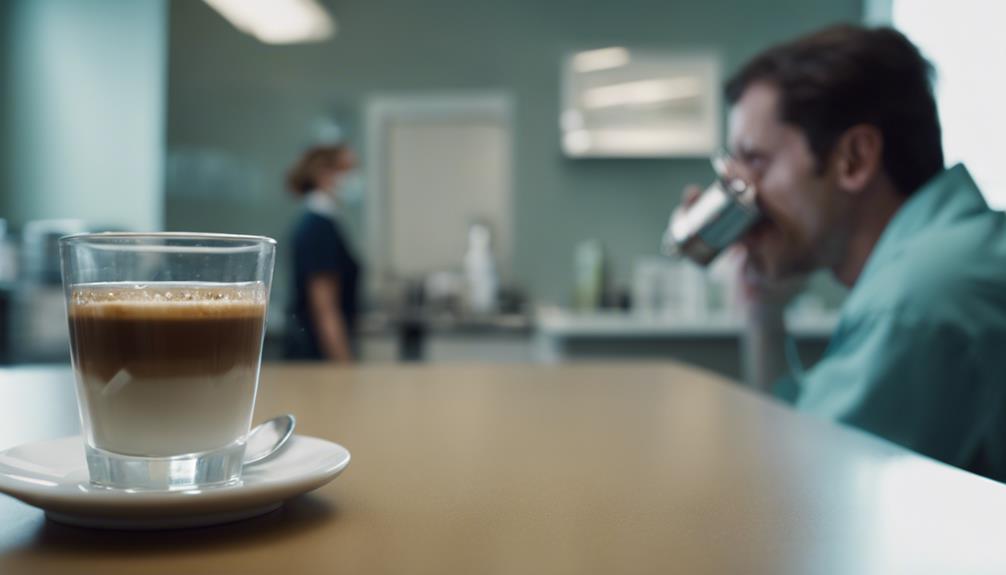
Drinking caffeinated beverages after a tooth extraction can impede the healing process due to caffeine's impact on blood pressure and clotting. Timing is vital as hot coffee can dislodge the blood clot, leading to complications like dry socket.
Excessive consumption of coffee post-extraction may further delay healing and increase the risk of complications.
Caffeine's Healing Effects
Influencing the healing process, caffeine from coffee can impede recovery after a tooth extraction by impacting blood pressure and clot formation. The increased blood pressure caused by caffeine can disrupt the formation of a stable blood clot at the extraction site, essential for proper healing.
Additionally, coffee's diuretic properties can heighten the risk of dehydration, a vital factor in post-extraction recovery. The heat from coffee can exacerbate inflammation and irritate sensitive nerve endings in the extraction site, potentially prolonging the healing process.
Consuming coffee too soon after a tooth extraction may dislodge the blood clot, leading to complications such as dry socket and delayed recovery. To promote the best healing, it's advisable to wait at least 72 hours before reintroducing lukewarm or cold coffee post-tooth extraction.
This precaution minimizes risks associated with blood clot disruption and supports the body's healing mechanisms.
Timing of Caffeine Intake
When should you consider reintroducing caffeine after a tooth extraction to avoid hindering the healing process? Here are some essential tips to keep in mind:
- Wait for the Right Time: It's advisable to wait for 48-72 hours before reintroducing caffeine post-tooth extraction to prevent any complications.
- Impact on Blood Clot Formation: Caffeine can affect blood clot formation, which is important for proper healing. Delaying coffee intake can help maintain the integrity of the clot.
- Dehydration Concerns: Coffee's diuretic properties can lead to dehydration, which is crucial for a speedy recovery. Ensuring adequate hydration is essential during the healing process.
- Seek Personalized Guidance: Consulting with oral surgeons or dentists for personalized guidance on when to resume coffee consumption can provide tailored advice for the best healing and prevent any setbacks.
Risks of Excessive Consumption
Excessive caffeine intake following a tooth extraction poses important risks to the healing process, potentially exacerbating complications and delaying recovery.
Caffeine's dehydrating effect can impede proper healing by reducing the body's ability to form essential blood clots at the extraction site. Additionally, the dilation of blood vessels caused by caffeine heightens the risk of bleeding, further hindering the healing process.
The acidity of coffee can irritate the extraction site, leading to potential complications like dry socket, which can greatly delay recovery. The diuretic properties of coffee exacerbate dehydration, an essential factor in impeding the healing process.
To promote proper healing and minimize risks of bleeding, dry socket, and other complications, it's essential to limit caffeine intake post-extraction. By avoiding excessive coffee consumption for at least 72 hours following the procedure, you can create favorable conditions for healing and reduce the likelihood of complications that could prolong your recovery.
Importance of Coffee Temperature Post-Extraction

Maintaining an ideal coffee temperature post-tooth extraction is paramount for promoting comfortable healing and minimizing potential complications. Here are four essential points to take into account:
- Hot coffee can be detrimental:
Hot coffee can aggravate sensitive nerve endings in the extraction site, leading to increased pain and discomfort. The high temperature can also disrupt the formation of a blood clot, essential for proper healing after extraction.
- Cold coffee isn't the perfect alternative:
While cold coffee is less damaging than hot coffee, it still contains caffeine, which can interfere with the healing process. The acidity of coffee can also negatively impact the blood clotting process, potentially delaying healing.
- Wait for the right time:
It's advisable to wait at least 72 hours post-extraction before consuming lukewarm or cold coffee to minimize potential complications.
- Consider the long-term effects:
Both hot and cold coffee can have implications on the healing process, so it's important to be mindful of your coffee temperature choices to support optimal recovery.
Safe Timing for Coffee Consumption

You should wait at least 72 hours after a tooth extraction before indulging in your favorite cup of coffee. Consuming coffee too soon can increase the risk of complications like dry socket and hinder the healing process.
Following the recommended waiting period is essential to guarantee a smooth recovery and minimize potential issues post-extraction.
Coffee and Healing
After tooth extraction, it's generally safe to wait 72 hours before consuming coffee to promote ideal healing.
Here are some key points to keep in mind:
- Drink Coffee After Wisdom: Waiting the recommended 72 hours before consuming coffee allows the extraction site to heal properly, reducing the risk of complications.
- Dry Socket Prevention: Reintroducing lukewarm or cold coffee after this period can help prevent dry socket, a painful condition that delays healing.
- Smooth Recovery: Avoiding coffee for the initial 72 hours aids in promoting a smoother recovery process by allowing the blood clot to form and the extraction site to begin healing undisturbed.
- Healing Benefits: Following the advised timeframe for coffee consumption post-tooth extraction can greatly contribute to a faster and more effective healing process, ensuring an excellent recovery.
Risks of Early Consumption
To guarantee ideal healing and minimize complications post-tooth extraction, it's essential to refrain from consuming coffee within the first 72 hours. Early coffee intake poses risks such as the development of dry socket, a painful condition where the extraction site fails to heal correctly.
When coffee is consumed too soon after the procedure, it can disrupt the formation of the important blood clot necessary for proper healing. This clot acts as a protective barrier, aiding in the recovery process.
By waiting at least 72 hours before indulging in coffee, you allow the extraction site to heal properly without interference. Drinking coffee prematurely may irritate sensitive nerve endings in the area and hinder the healing process.
Following the recommended timeframe for coffee consumption post-extraction is crucial to reduce the chances of complications and ensure a smooth recovery without setbacks. Remember, patience in this regard can greatly contribute to your overall oral health and well-being.
Optimal Timing Recommendations
Waiting at least 72 hours before indulging in coffee post-tooth extraction is strongly recommended by dental professionals to promote ideal healing and minimize the risk of complications. When to drink coffee after tooth extraction is a common question among patients, but it is crucial to follow the advice of your dentist or oral surgeon. The hot temperature and acidity of coffee can irritate the extraction site and delay healing, so it is important to wait until the recommended time frame has passed before reintroducing coffee into your diet. It is always best to consult with your dental professional for personalized recommendations based on your specific oral health needs.
Here are some essential guidelines to guarantee safe timing for coffee consumption after a tooth extraction:
- Allow the Extraction Site to Heal: Giving your body ample time, specifically 72 hours, to form a stable blood clot at the extraction site is vital in minimizing the chances of complications such as dry socket.
- Prevent Disruption of Healing: Delaying coffee intake for the recommended 72-hour period helps in preventing any disturbance to the healing process, allowing for a smoother recovery.
- Minimize Risk of Dry Socket: Following the advice to wait 72 hours before consuming coffee significantly reduces the risk of developing dry socket, a painful condition that can occur post-extraction.
- Promote Ideal Recovery: By adhering to the 72-hour waiting period, you're actively contributing to your body's ability to heal effectively and efficiently after a tooth extraction.
Considerations for Cold Coffee Intake
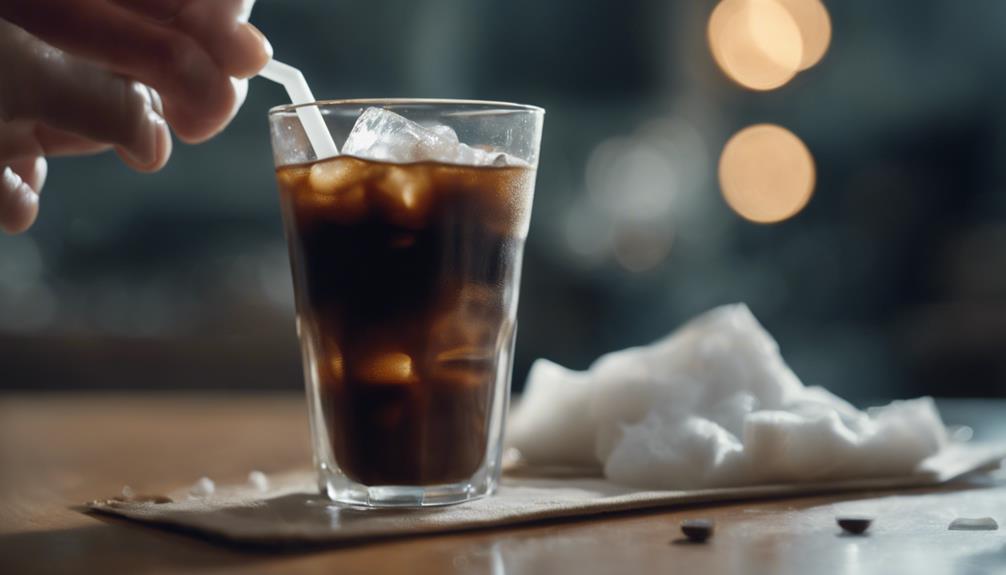
Consider refraining from consuming cold coffee immediately following a tooth extraction procedure. While cold coffee may seem like a vital option, it still contains caffeine and acidity that can impede the healing process.
It's advisable to wait for at least 72 hours after a simple extraction before indulging in lukewarm or cold coffee. The caffeine present in cold coffee can have adverse effects on the healing tissues in your mouth, potentially delaying recovery.
Opting for warm beverages initially can be more advantageous until the bleeding has mostly subsided. By avoiding iced coffee during the initial stages of recovery, you can support the formation of a stable blood clot and promote better healing outcomes.
Prioritizing your oral health by making small adjustments like choosing warm beverages over cold coffee in the important first few days post-extraction can significantly contribute to a smoother and faster recovery process.
Acidity's Effect on Blood Clot Formation
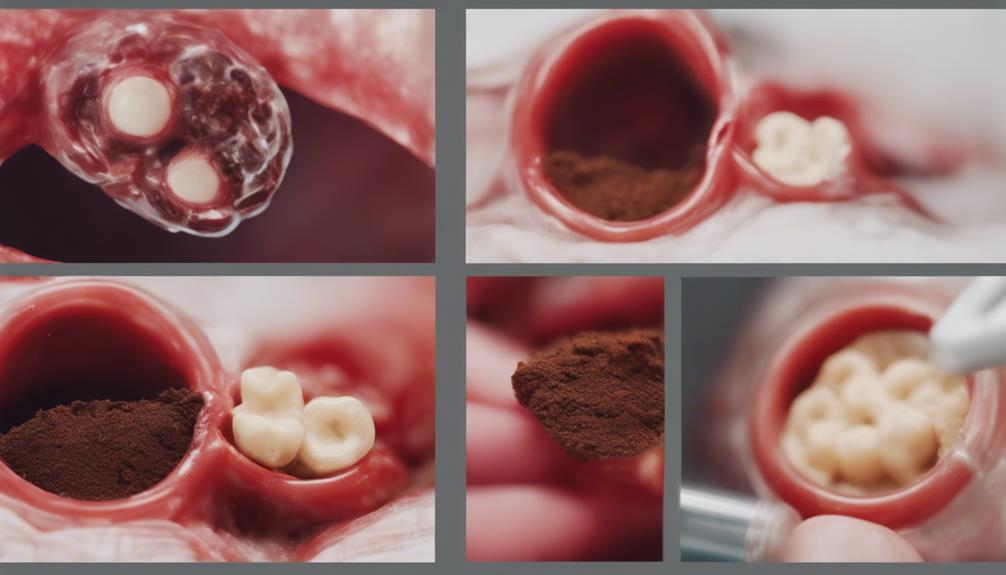
Coffee's acidity greatly influences the formation of blood clots after a tooth extraction. When pondering the impact of acidity on blood clot formation, it's vital to grasp the implications for your healing process.
Here are some key points to ponder:
- Delaying Consumption: Immediate coffee intake post-extraction can disrupt the formation of a protective blood clot, potentially leading to complications in the healing process.
- Prolonged Clotting Time: The acidity of coffee can prolong the time it takes for a blood clot to form, which is essential for proper wound healing after a tooth extraction.
- Hindering Wound Healing: Studies have shown that coffee's acidity may hinder wound healing when consumed shortly after a tooth extraction, emphasizing the importance of timing in post-operative care.
- Protective Measures: To ensure satisfactory healing, it's advisable to avoid coffee or any acidic beverages for the recommended period after a tooth extraction, allowing the blood clot to form adequately.
Tips for Pain Prevention and Oral Health
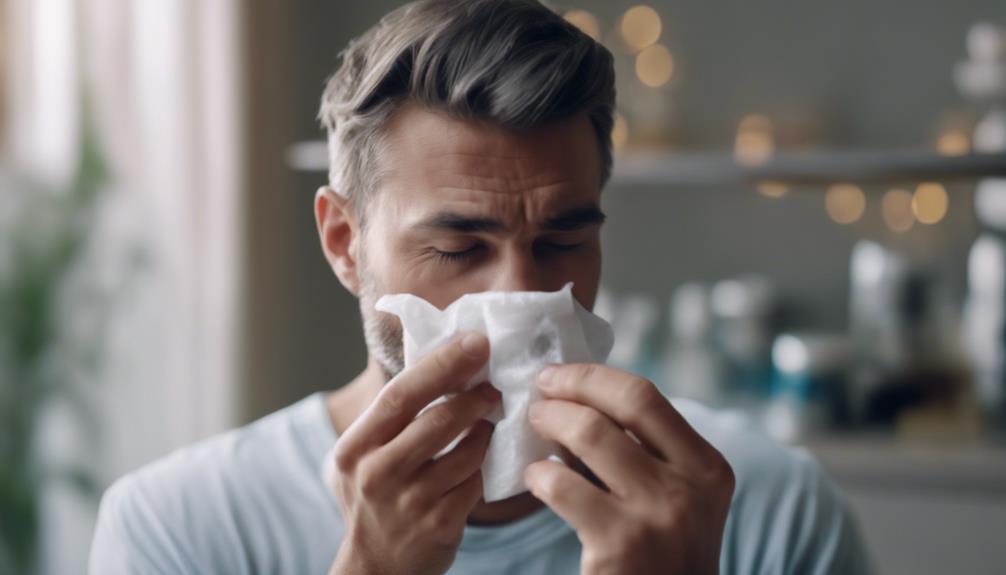
To promote pain prevention and maintain peak oral health after a tooth extraction, prioritize hydration with water over coffee in the initial days following the procedure. Waiting 72 hours before consuming coffee can greatly lower the risk of complications such as dry socket. It's vital to avoid cold or iced coffee immediately after the extraction, as the temperature can disrupt the healing process.
The acidity and temperature of coffee can also irritate sensitive nerve endings, potentially hindering the formation of a blood clot necessary for proper recovery. Instead, opt for lukewarm beverages and refrain from using straws to support a smoother recovery process.
Gradual Reintroduction of Coffee

After waiting 72 hours post-tooth extraction, consider gradually reintroducing coffee to minimize potential complications and support proper healing. Here are some tips to help you with the gradual reintroduction process:
- Start with lukewarm or cold coffee: This temperature can be vital on the healing area, reducing the risk of irritation.
- Consult with your dentist: Before reintroducing coffee, it's important to seek advice from your dentist to guarantee a smooth recovery process.
- Allow the extraction site to heal properly: Gradual reintroduction gives the area time to recover and reduces the chances of complications.
- Minimize the risk of disrupting blood clot formation: By reintroducing coffee slowly, you can help protect the blood clot, which is essential for the healing process.
Monitoring Oral Health Post-Extraction

To guarantee proper healing and prevent complications, it is essential to monitor your oral health closely following a tooth extraction. After a tooth extraction, it is crucial to keep a vigilant eye on the extraction site for any signs of infection or complications. Monitoring any pain or discomfort that persists beyond the expected healing period is necessary to ensure a smooth recovery process. Watch out for excessive bleeding, swelling, or pus around the extraction area, as these could indicate potential issues. By being vigilant about maintaining good oral hygiene, you can significantly reduce the risk of post-extraction complications. Remember to seek immediate dental attention if you experience severe pain, fever, or any unusual symptoms after the extraction procedure.
| Signs to Monitor After Tooth Extraction | What to Do |
|---|---|
| Infection or complications at extraction site | Seek dental attention |
| Persistent pain or discomfort | Monitor closely and inform your dentist |
| Excessive bleeding, swelling, or pus | Contact your dentist immediately |
Frequently Asked Questions
Can I Drink Coffee 3 Days After Tooth Extraction?
You should avoid drinking coffee three days after a tooth extraction to aid in your healing process. Hot coffee can dislodge the blood clot, leading to complications like dry socket.
Additionally, coffee's acidity and caffeine content may hinder proper healing. Stick to lukewarm or cold coffee after the initial 72-hour period to promote healing without risking complications.
Following these guidelines will help guarantee a smoother recovery post-extraction.
What Can I Drink 72 Hours After Tooth Extraction?
You can safely consider drinking lukewarm or cold beverages 72 hours post-tooth extraction. Cold drinks like coffee may cause sensitivity, so it's best to avoid them immediately after. Hot beverages should also be avoided initially to prevent irritation.
Focus on staying hydrated and maintaining oral health. Gradually reintroduce coffee after 72 hours to minimize potential risks and support the healing process. Remember to prioritize your recovery and follow post-extraction care guidelines.
What Happens After 72 Hours of Tooth Extraction?
After 72 hours of a tooth extraction, the healing process progresses significantly. Bleeding should have almost ceased, allowing for more comfortable consumption of lukewarm or cold beverages like coffee.
The extraction site begins to heal, reducing sensitivity to temperature and acidity in drinks. It's generally safe to reintroduce coffee in moderation post-72 hours, while following proper post-extraction care can aid in smoother healing beyond this important timeframe.
Is It Normal to Have Pain 72 Hours After Tooth Extraction?
Yes, it's important to experience pain 72 hours after tooth extraction. This discomfort commonly arises during the healing process as your body works to repair the extraction site.
Inflammation and tenderness are expected symptoms that may persist after the initial 72-hour period.
It's vital to monitor your pain levels and contact your dentist if severe or worsening pain continues beyond this point to guarantee proper healing and address any concerns promptly.
Conclusion
In summary, while it may be tempting to indulge in a cup of coffee after a tooth extraction, it's important to contemplate the potential risks and impact on the healing process.
By following the recommended guidelines and being mindful of temperature, acidity, and timing, you can guarantee a smoother recovery and maintain good oral health.
Remember to listen to your dentist's advice and gradually reintroduce coffee into your routine to avoid any complications.
